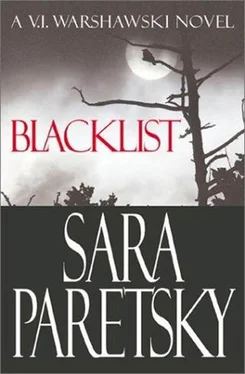“Renee Bayard was telling me this morning that Taverner had a bee in his bonnet about the Committee for Social Thought and Justice. There’s a rumor that Calvin Bayard gave them money.” A rumor I myself was just
starting, but he might have been the patron mentioned in the Ballantine archive.
“Oh, Calvin was generous with many left-wing groups in the thirties and forties. There’s never been any doubt where his politics lay. But just because he published known Communists like Armand Pelletier, I don’t think anyone ever seriously believed Calvin was a Communist himself Not even Olin, when he was hounding him back in the fifties. I think they were simply two men who didn’t like each other. Calvin was the flamboyant young success, Olin had to climb his way slowly. And Olin was hampered by the homosexuality you alluded to. By the way, I understand Darraugh Graham hired you to find who his mother was seeing in the Larchmont attic. Did you ever discover who was there?”
I shook my head slowly. Somehow I’d forgotten the original inquiry that had taken me out to New Solway. “Catherine Bayard told me it was her grandfather, that he had a key to the old Graham house.”
Arnoff made a sound like an engine starting in cold weather; I realized after a startled moment he was laughing. “So young Catherine has all the Bayard spirit. One never knows how the next generation will behave with so much wealth available to it.”
“But when I asked Darraugh about it, he became furious.”
“I’m afraid I’m not in Graham’s confidence, young woman; he took his legal affairs elsewhere,” Arnoff said. “He was much attached to his father, however, and Mrs. Drummond’s attitude when MacKenzie Graham died did cause Darraugh to run away that summer. He was something like fourteen or fifteen. Eventually he returned to Exeter to finish his education but I don’t believe he ever returned to Larchmont.”
“Was there something especially difficult about MacKenzie Graham’s death?” I asked.
“All deaths are difficult. But MacKenzie had hanged himself, as I understand it.”
“But why?” Larry Yosano was startled into speaking.
“He was at that age,” Arnoff said. “In my experience, the unhappy of the Earth either learn to live with it by the time they’re fortyfive, or they decide they no longer can make the effort. It was particularly unfortunate that Darraugh found his father’s body. I believe his father didn’t know Exeter had sent him home. MacKenzie was very attached to his son. I doubt he would have killed himself, at least not then, had he known Darraugh was there.”
I tried to digest this. “By Ms. Graham’s account, it was an unhappy household. Why did she and Mr. Graham marry in the first place? And why did they never move into a place of their own?”
“Had you known Mrs. Matthew Drummond, you would have understood the answer to both questions. Mr. and Mrs. MacKenzie Graham both caused their parents considerable anxiety when young, as Mr. Lebold explained the matter to me. Both Mrs. Drummond and Mr. Blair GrahamMr. MacKenzie’s father, that is-thought marriage would settle the two young people down. Of course, when I came into the firm, Mrs. Drummond was sixty-five, but she was still a formidable power. In fact, she refused at the outset to work with-” Arnoff broke off.
“She wouldn’t work with a Jewish lawyer?” I suggested.
“She had old-fashioned prejudices,” he said primly. “When Theodore Lebold made me a partner, a few took their business elsewhere, just as some did when we brought Yosano here into the firm, but most of New Solway saw then, as they do now, that Lebold, Arnoff still has their interests very much at heart.”
Scuba Diver
Twilight softened the pond’s surface, blurring the tangled nest of weeds so that only the lily pads showed. Even the dead carp looked as if it might be merely floating near the surface waiting for a fly to land.
When I left Arnoff’s office, I’d thought about returning to Chicago and leaving the pond until the morning, but that would have meant yet another drive out to the western suburbs. After all, it was going to be dark under all those weeds whether I went in at six in the morning or six at night.
All I had left in my thin arsenal was the dogged desire to find what Taverner had told Marc Whitby. Arnoff had dropped hints that I should be able to sort out. He clearly was proud of knowing the secrets swirling around New Solway. Like indiscretions that Calvin Bayard should never have committed to paper. Or at least made sure were far from his son’s prying eyes.
I negotiated the turn onto the East-West Tollway, and joined the milelong backup at the tollbooths. Arnoff had said no one, not even Taverner, ever seriously believed Calvin Bayard was a Communist. So what else had he done that had shocked his son into becoming ultraconservative? And done on paper?
I inched forward. That was what was so frustrating about this parade of prima donnas. All of their lives were intertwined, by history, by marriage, by shared lies. They were like a group playing three-card monte, and laughing as I kept diving for the court card. I was beginning to doubt a South Side street fighter could be a match for such smooth hustlers.
I oozed off the tollway at Warrenville Road. I could find my way from the tollway to Larchmont Hall on autopilot by now. At Larchmont, I pulled my Mustang around behind the barn, where it was hidden from both the road and the woods connecting to the Bayard estate. If someone-say, young Catherine, or even Ruth Lantner-were visiting Larchmont Hall, they wouldn’t be able to see the car.
Before leaving Oak Brook, I’d stopped in the shopping center to change out of my business clothes and put on a swimsuit, sweatshirt and jeans. These last I took off now and left in the car. I squirmed my way into the wet suit. The rubber was hard to maneuver. I was sweating from exertion by the time I finished, but feeling clammy at the same time from the cold rubber against my skin.
I put on the diver’s headlamp I’d bought this morning. Tucking the twine and small knife under my arm with fins and goggles, I padded around the barn, through the overgrown gardens to the pond.
I’d never done underwater work, but I’d learned to swim in Lake Michigan. In fact, my cousin Boom-Boom and I used to drive our mothers mad with worry by going into the foul waters of Lake Calumet, since that was closer to our homes. Funny how the stuff that’s exciting when you’re a kid with a scolding mother in the background seems horrifying when you’re an adult on your own. If Boom-Boom were here, it would be an adventure. If Boom-Boom were still alive, I wouldn’t feel so alone. Self-pitying tears spurted out. I dashed them away angrily. You’re a woman saved by action, I mocked myself get the damned fins on and get going.
The water was as nasty as I’d imagined. I made a face, then pulled the goggles over my eyes, stuck the breathing tube between my teeth, and did a handstand, trying to ignore the shock of cold water against my head. Almost at once, I became tangled in the nest of roots. Picking and kicking my way through them got my blood flowing enough to keep the cold at bay, although it also stirred up dirt from the bottom, making it harder to see anything-the headlamp couldn’t penetrate more than a few feet of this murk. As I’d expected, it didn’t matter that I’d gotten to the job late-daylight wouldn’t have made it through the knotted vegetation on the surface.
I estimated I had about four hundred square feet to cover. I grimly set about working the lanes: headstand, paw my way through the roots, feel the bottom, surface for air, repeat. The breathing tube was useless, so I laid it along the pond ledge. Each time I reached one of the walls, I’d tie off a length of twine. I started at the west end, where I’d tumbled onto Marc’s body on Sunday.
Читать дальше












